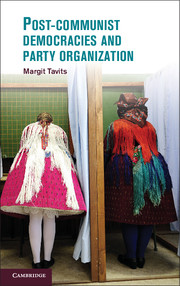4 - Organizing for Unity
Organizational Strength and Parties in Parliament
Published online by Cambridge University Press: 05 June 2013
Summary
Institutionalized parties are not only electorally successful but also develop a unified identity and behave in a coordinated and cohesive manner in parliament. The goal of this chapter is to understand why some parties are better at achieving such unity than others. In addition to being an important aspect of party institutionalization, this question is of considerable scholarly and substantive interest because lack of party unity threatens the quality of representation and the efficiency of governing, and thereby undermines the stability of democracy. Examples of serious consequences arising from MP dissent abound. In Estonia in 2002, the failure of two coalition politicians to vote with their party helped derail the budgetary process (Parve 2002). Defections within the ruling party have contributed to several significant policy failures in Slovakia including the failure to elect a president in 1993 and the adoption of the opposition proposal for administrative-territorial reform in 2001 (TASR News Agency 2001). The European Union Lisbon Treaty was ratified in Slovakia only with the help of dissenting opposition members (EU Business 2008). In 1993, the Polish government fell after intra-party dissent helped fail a vote on the budget (Perlez 1993). The Czech government fell in March 2009 with the help of four lawmakers breaking ranks with their party and voting with the opposition (Bos 2009). In 2003, the ruling ČSSD in the Czech Republic failed to unite and push through their presidential candidate (CTK 2003d).
A growing literature argues that political institutions influence party unity (Carey 2009; Diermeier and Feddersen 1998; Hix 2004; Hix, Noury, and Roland 2005; Mainwaring 1999; Morgenstern 2004; Owens 2003; Sieberer 2006). These studies assume that legislators are primarily motivated by reelection and that institutional structures constrain their voting behavior in pursuit of this goal. If the institutional setting allows attaining the goal only through party leadership, then legislators will adhere to the party line in their voting. However, the institutional setting can create opportunities to achieve the goal by some other way – for example, through a direct relationship with voters. In this case, party loyalty in parliament becomes less important.
- Type
- Chapter
- Information
- Post-Communist Democracies and Party Organization , pp. 112 - 129Publisher: Cambridge University PressPrint publication year: 2013



